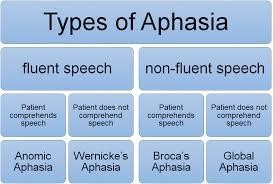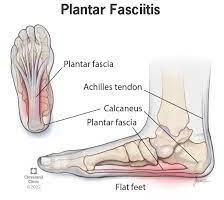The nurse is assessing a patient with suspected neurological issues. The patient's speech is delivered with normal rhythm but filled with words that do not form any meaningful statements.
The patient is also unable to write or repeat back words and does not appear to understand the nurse's instructions or questions. The nurse would recognize these symptoms as:
Expressive aphasia
Broca's aphasia
Global aphasia
Wernicke's aphasia
The Correct Answer is D
Choice A rationale: Expressive aphasia is a type of non-fluent aphasia that affects the
ability to produce language. It is caused by damage to the anterior part of the left frontal lobe, which is responsible for motor planning and execution of speech. Patients with expressive aphasia can understand language but have difficulty speaking, writing, or naming objects. They often produce short, halting, and grammatically incorrect sentences with word-finding difficulties.
Choice B rationale: this is another term for expressive aphasia. The patient can
understand language but have difficulty speaking, writing, or naming objects. They often produce short, halting, and grammatically incorrect sentences with word-finding difficulties.
Choice C rationale: Global aphasia is a severe form of aphasia that affects both
comprehension and production of language. It is caused by extensive damage to the left hemisphere of the brain, which is dominant for language functions in most people.
Patients with global aphasia have little or no ability to speak, write, read, or understand language.
Choice D rationale: Wernicke's aphasia is a type of receptive aphasia that affects the
comprehension and production of language. It is caused by damage to the posterior part of the left temporal lobe, which is responsible for processing auditory and visual
information. Patients with Wernicke's aphasia can speak fluently but nonsensically, using words that are irrelevant, invented, or distorted. They also have difficulty understanding spoken or written language and following commands.

Nursing Test Bank
Naxlex Comprehensive Predictor Exams
Related Questions
Correct Answer is B
Explanation
Choice A rationale: Intubation and mechanical ventilation may be needed if the respiratory muscles are affected by GBS, but this is not a routine intervention at this stage.
Choice B rationale: One of the main treatments of GBS is IV immunoglobulin therapy (IVIG), which involves infusing antibodies from donated blood plasma to block the harmful immune response that damages the nerves. Sandoglobulin is one of the brand names of IVIG used for GBS. IVIG can help shorten the duration and severity of the disease, and improve the recovery rate.
Choice C rationale: Methylprednisolone is a corticosteroid that can reduce inflammation, but it is not recommended for GBS, as it may worsen the condition or increase the risk of infection.
Choice D rationale: NG feeding tube may be required if the patient has difficulty swallowing, but this is also not a standard intervention at this time.
Correct Answer is A
Explanation
Choice A rationale: Plantar fasciitis typically presents with severe pain in the arch of the foot, especially during the first steps in the morning or after prolonged periods of rest.
Choice B rationale: Multiple toe deformities are not typically associated with plantar fasciitis.
Choice C rationale: Redness and severe swelling are not typical findings in plantar fasciitis.
Choice D rationale: Numbness and paresthesia are not common findings in plantar fasciitis.
 |
Whether you are a student looking to ace your exams or a practicing nurse seeking to enhance your expertise , our nursing education contents will empower you with the confidence and competence to make a difference in the lives of patients and become a respected leader in the healthcare field.
Visit Naxlex, invest in your future and unlock endless possibilities with our unparalleled nursing education contents today
Report Wrong Answer on the Current Question
Do you disagree with the answer? If yes, what is your expected answer? Explain.
Kindly be descriptive with the issue you are facing.
